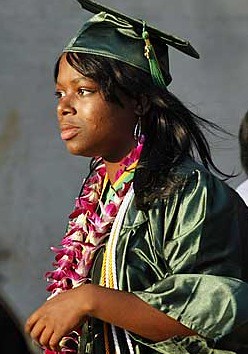 Khadijah Williams grew up homeless in Los Angeles. She and her mother moved from shelter to shelter, sometimes sleeping on the streets at night if the shelter was full. She was surrounded by prostitutes, drug users, and criminals. Moving from school to school, some years she missed weeks—and even months—of schooling while her mother searched for housing.
Khadijah Williams grew up homeless in Los Angeles. She and her mother moved from shelter to shelter, sometimes sleeping on the streets at night if the shelter was full. She was surrounded by prostitutes, drug users, and criminals. Moving from school to school, some years she missed weeks—and even months—of schooling while her mother searched for housing. In third grade, Khadijah made a decision that changed her life. She decided to study hard, learn everything she could, and excel in school. She decided that her circumstances would not determine her destiny.
When she started her junior year of high school, Khadijah realized that she could no longer continue moving constantly and succeed in school. She got up at 4 a.m., caught a city bus in Las Angeles, and attended high school, returning to the shelter late at night after she finished her homework. She graduated from high school with high honors and received full scholarships to many prestigious universities. She is now enrolled as a freshman at Harvard, where she plans to study law.
Khadijah Williams does not blame her mother for her challenging childhood. She is grateful that her mom never used drugs, did not smoke or drink, and that her mom encouraged her pursuit of academic excellence. She does not feel anger towards her mother because she was unwilling or unable to provide her children with a stable, comfortable home.
It’s easy to blame others for our self-defeating choices. We may think, “Since that guy cut me off in traffic, he made me lose my temper.” “Since my mom (or dad) was an imperfect parent, they caused me to make bad choices.” “Since my boss/neighbor/friend/family member said or did something that I don't like, they forced me speak/act/live in anger/bitterness/fear.”
The truth is this: no one can force you to become something that you do not want to be. We are free to choose love, peace and compassion or we can choose hate, fear, and apathy. The choice is ours and ours alone.
In his book Man’s Search for Meaning, Viktor Frankl, a concentration camp survivor, states, “ Everything can be taken from a man or a woman but one thing: the last of human freedoms, to choose one's attitude in any given set of circumstances, to choose one's own way.”He also states, “When we are no longer able to change a situation--we are challenged to change ourselves.”
Taking responsibility for our lives, emotions, and actions can be both freeing and terrifying. When we can no longer blame anyone for our thoughts, words, and actions, we become powerful masters of our own lives. Regardless of our circumstances, childhood, and challenges, we are free to create lives of beauty, goodness, and happiness. For some, this may feel frightening, since they can no longer use others as their scapegoat for their self-defeating choices or bad behavior.
Some of the most miserable people I know blame others for their choices. “If I hadn’t been so poor growing up, I wouldn’t be addicted to shopping,” one woman says. “If my dad hadn’t been so abusive, I wouldn’t be filled with so much anger and bitterness,” a man states. “If my mom hadn’t been so strict, I wouldn’t be drinking and rebelling right now,” a woman explains.
One of the most critical choices we can make is to decide to live responsibly. Since each of us has amazing talents, gifts, and abilities, we have the innate potential to become powerful forces for good in the world. We cannot fulfill our unique mission in life if we are consumed with bitterness, blame, and anger. As we free ourselves from these negative emotions, we can live peacefully in the moment and find joy in the journey.
© Carol Brown



These are great thoughts for me right now. Thank you for the wonderful examples and ideas to ponder. I love the idea of changing myself when a situation no longer can be. Thank you.
ReplyDelete